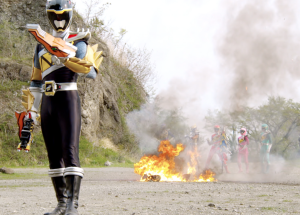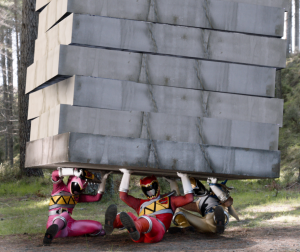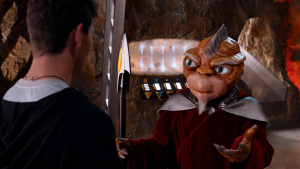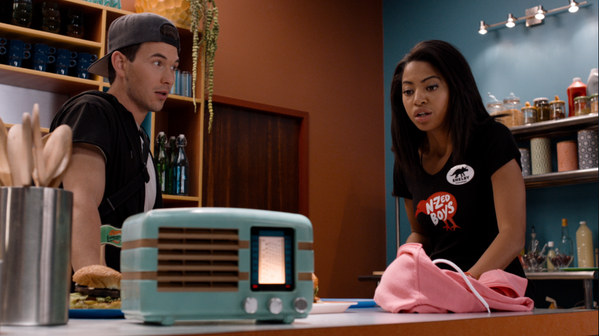Summary: Chase learns a lesson on empathy we all need to remember sometimes in a very message-driven episode.
Recap
During a training session, Ms. Morgan gives Chase Dino Armor X, a drill power that works perfectly. Chase catches Shelby listening to N-Zed Boys, a New Zealand band that Chase thinks is silly. He makes fun of Shelby for liking them, which Shelby tries to ignore. However, when he’s an hour late for work, Shelby isn’t able to go out and buy tickets for their first (and possibly only) concert in the US, and they sell out before she can get them. Chase doesn’t see what the big deal is, and continues to tease Shelby for liking them, severely hurting her feelings, but thinking it’s not a big deal. When Gold Digger, a monster with exploding coins and impenetrable concrete slabs appears, he traps Shelby, Tyler, and Ivan underground with little air. Chase tries to use his Dino Armor X to break through the slabs, but it doesn’t work.
The remaining Rangers retreat, and after checking the Dino Charger, Ms. Morgan determines that nothing is wrong with it. She gives the Armor X charger to Riley and Coda to try, unsure if their energies would work with it. Keeper tells Chase that the Energem is linked to his heart, meaning if he isn’t true to it, then it won’t work properly. Back in battle, Riley and Koda’s chargers don’t work, and Chase realizes that he wasn’t being true to his heart when he hurt Shelby’s feelings. He apologizes to her over their comm device, and she accepts the apology. Chase is able to use his Armor X correctly now, drilling through the slabs and rescuing the Rangers. With all the Rangers together, they fight Gold Digger in the Megazord and defeat him as usual. Afterwards, all the Rangers try to call into the local radio station to win tickets to the N-Zed boys concert for Shelby, and Chase is the one to get through and win them.
Review
 It should go without saying, but watching Power Rangers always requires an understanding that it’s is made for a very specific demographic: children. This is a show that ultimately has a limit on what it can do, and more importantly, what kind of messages it ought to focus on. While plenty see that sort of thing as a turn-off, that’s also exactly what gets some adults hooked on kids’ shows — the messages have to be different and more focused than what shows made for adults have. When shows are made for kids, even when minimal censorship is involved (like Cartoon Network has been the champion of in its recent golden age of kids’ TV), they still can’t and shouldn’t do all the things “adult” shows do. The argument we adult kids’ show fans have always made is that, even if they aren’t dealing with those same adult things, it doesn’t mean they can’t resonate with adults all the same.
It should go without saying, but watching Power Rangers always requires an understanding that it’s is made for a very specific demographic: children. This is a show that ultimately has a limit on what it can do, and more importantly, what kind of messages it ought to focus on. While plenty see that sort of thing as a turn-off, that’s also exactly what gets some adults hooked on kids’ shows — the messages have to be different and more focused than what shows made for adults have. When shows are made for kids, even when minimal censorship is involved (like Cartoon Network has been the champion of in its recent golden age of kids’ TV), they still can’t and shouldn’t do all the things “adult” shows do. The argument we adult kids’ show fans have always made is that, even if they aren’t dealing with those same adult things, it doesn’t mean they can’t resonate with adults all the same.
Beyond that, though, there’s something the themes and messages of kids’ shows can offer that primetime dramas can’t always muster. We grown-ups have plenty of stories dealing with life’s tragedies, the complexities of sex and violence, and any of the harsher, grimmer, ambiguous politics of the world. Kids’ shows, conversely, are tasked with creating character conflict out of more personal, relatable and simpler problems, which means they often have to be creative with how they handle them while capturing the essence of conflicts we’ve all experienced, regardless of our circumstances.
This leads to television that, while perhaps not as riveting or twisty as primetime, still reaches a very specific aspect of our hearts and feelings that resonates. They’re lessons we still need to remember, even if we were already taught them in childhood — how to be a better friend, how to cooperate, how to lead, how to take responsibility. Shows like Adventure Time and Steven Universe are notable for still dealing with more complex issues and relationships, but even they are boiled down to the basic life lessons you could probably summarize in a sentence. That’s important, not just because kids benefit from having the complexities of life clarified, but because sometimes we grown-ups need to be reminded of the simple basics, too.
 All that’s to say, “True Black” is a simple and basic lesson for kids — pay attention to your friends’ feelings — but it never stops being relevant at any age. In fact, Chase’s problem here is one that we’ve all seen coworkers, classmates, friends, or family do — they go too far, hurt someone’s feelings, and refuse to own up to it. The intention may not have been to hurt, and we might not fully understand why the other person may have been so hurt, but that doesn’t discount the fact that we did hurt someone. Any of us who have watched Power Rangers past its designated demographic has surely had people tease us for liking something we “aren’t supposed to like” by society’s standards.
All that’s to say, “True Black” is a simple and basic lesson for kids — pay attention to your friends’ feelings — but it never stops being relevant at any age. In fact, Chase’s problem here is one that we’ve all seen coworkers, classmates, friends, or family do — they go too far, hurt someone’s feelings, and refuse to own up to it. The intention may not have been to hurt, and we might not fully understand why the other person may have been so hurt, but that doesn’t discount the fact that we did hurt someone. Any of us who have watched Power Rangers past its designated demographic has surely had people tease us for liking something we “aren’t supposed to like” by society’s standards.
Similarly, Chase teases Shelby for liking a band that sounds a lot like One Direction, which is appropriate since that’s a group specifically aimed at a demographic younger than Shelby’s. Since Chase doesn’t take the music seriously, he assumes Shelby shouldn’t either, and doesn’t catch onto how much telling Shelby that makes her feel like dirt. It’s obvious to us as viewers, sure. It’s obvious to the other Rangers when they see it go down. But it’s not obvious to Chase, who does honestly respect Shelby as a person, and assumes she’d laugh it off and agree. She doesn’t, but he doesn’t know why.
The simple lesson here: empathy. Chase doesn’t get why Shelby’s mad, not understanding that something unimportant to him is very important to her, and he’s being a bad friend by disrespecting that. That lack of empathy breaks up marriages and friendships and families sometimes — just being able to see why a person is hurt, and not just assume they should have “tougher skin,” is the first step to a solid relationship. What’s even more interesting about this, looking at it as an adult, is how rooted this problem is in the world at large. One of the most frustrating hurdles for any social movement is the majority just not getting why the minority is upset and fighting back on blind ignorance. Much of the pushback on the trans rights movement, for example, is people simply not understanding why misgendering is a big deal, belittling the people they’re hurting. Obviously the issues are more complex than that, but at the basest level, that lack of willingness to have the slightest bit of empathy is the first brick wall people have to break down. Like “The Royal Rangers,” Power Rangers seems to unintentionally (or perhaps intentionally?) say a little something about society as a whole, even among the colorful explosions and wacky monsters.
 Of course, the episode itself remains on the personal level of friendship. The disappointing thing about “True Black” is that it’s so on-the-nose about it’s lesson, even moreso than Power Rangers usually is. It’s not necessarily bad to have Keeper lay out “The energem is linked to your heart and you weren’t true to your heart by doing something bad” — it gives Keeper something to do, at least — but it’s a little too hammered in for its own good. A lot of this episode feels artificially constructed — the Dino Armor X just happens to only work with “Black energy,” on the day that Chase just happens to be uncharacteristically mean to Shelby, on the day that the weapon just happens to be the only thing that can defeat the monster. Yeah, we need some of those coincidences to make episodes work, especially when we tie in monsters and Rangers battles into the main theme and personal story, but “True Black” relies on a few too many of them to make it function.
Of course, the episode itself remains on the personal level of friendship. The disappointing thing about “True Black” is that it’s so on-the-nose about it’s lesson, even moreso than Power Rangers usually is. It’s not necessarily bad to have Keeper lay out “The energem is linked to your heart and you weren’t true to your heart by doing something bad” — it gives Keeper something to do, at least — but it’s a little too hammered in for its own good. A lot of this episode feels artificially constructed — the Dino Armor X just happens to only work with “Black energy,” on the day that Chase just happens to be uncharacteristically mean to Shelby, on the day that the weapon just happens to be the only thing that can defeat the monster. Yeah, we need some of those coincidences to make episodes work, especially when we tie in monsters and Rangers battles into the main theme and personal story, but “True Black” relies on a few too many of them to make it function.
But, again, that doesn’t discount the message of the episode. And it’s of course helped by the performances; James Davies plays a Chase who honest-to-goodness has no idea what the problem is. We can’t really be mad at Chase, because Davies exudes an obliviousness that’s actually kind of charming. But that doesn’t mean we don’t feel for Shelby, who Camille Hyde nails when Chase upsets her. Shelby is a tough character to keep likeable sometimes, given that she’s written as somewhat petulant, but Hyde consistently captures a relatable spark that ought to keep us on her side. The two also share wonderful chemistry when the situation is dire — props to the show for having the Rangers nearly suffocating underground, which is definitely horrifying — and the heroic rescue should rightfully fuel a whole other group of shippers.
“True Black” is mostly inconsequential to the main storyline, outside of the creation of the cleverly designed, two-handed Dino Armor X. The monster, Golddigger, is a creative and confusing monster — I get the pickaxe and gold coins, but what do impenetrable slabs have to do with the buried treasure theme? — but it’s fun to have a gimmicky monster not have an episode written all around that gimmick. The ultimate triumph of “True Black,” though, is simply its message, as it should be considering how abundantly clear the episode hammers it in. But it’s a message worth hearing, and one Power Rangers insists we keep in mind all the time.
Odds & Ends
- I like the show’s tactic of using the prison set-up to explain the monster’s special power on Sledge’s ship, as the monsters are always trying to either win their freedom or simply escape the prison. It’s much better than the oft-used exposition scenes from a mentor in the Rangers’ HQ.
- Full disclosure: I dig One Direction and Zayn should have never left.
- Dino Charge finally addresses (like Mystic Force and Jungle Fury) that the Rangers leaving their shifts in the middle of a rush — especially by running out the front door in front of customers — is a bad idea. At least Ivan got a one dollar tip out of it, though.
- I love that these Rangers are so genre savvy. Koda picks up a bunch of weird coins near a monster attack, so of course they’re bombs.
- Why did Tyler and Ivan come flying out from the pit after Chase’s rescue, like they’d been thrown out?
- So, did that contest give away seven whole tickets? Also, Kendall’s immediate reaction of “We’re taking the night off!” upon hearing they won is hilarious.
- “This guy looks like a museum threw up!”
“You should talk ,you box of crayons!” - “Fighting you is easier than a spin class with training wheels!”
“I don’t get it, what’s a spin class?” - “At first song make me want to punch radio…now I love!” – I feel that, Koda.
- “Come on, no one’s perfect, but…I’m as close as it gets.”

